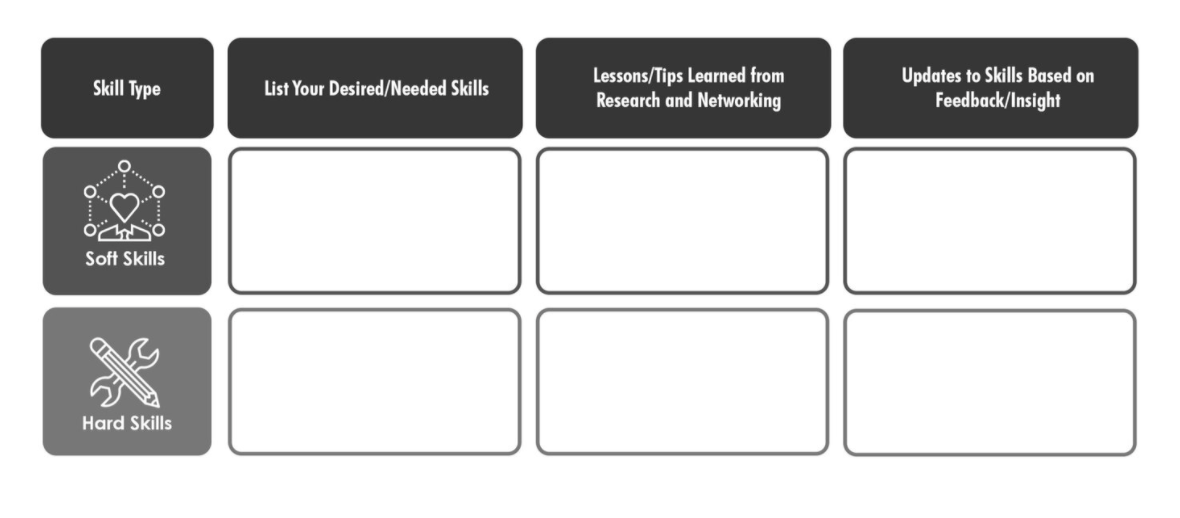Identifying Hard AND Soft Skills to Accelerate Your Career
When you are developing your plan for career success, the most important part of it is the execution. Plans don’t get the job done. And networking is fantastic to get your foot in the door, but the next step is making a lasting impression. Having the right skills means you become a valuable member of the team for years to come — or as a business owner, it means you can actually run the business you’re setting out to grow.
The Fluid Career System hinges on the skills you build and prepare yourself to apply in a work setting. Put simply, skills pay the bills. The wider the range of jobs you can perform, the more valuable you become to companies or as an entrepreneur. Mastering your current skills and learning new ones moves you forward from planning to execution.
When you’re thinking about building skills, consider this assessment:
You’ve probably already identified some core skills you should develop to achieve your goals. Make a list of all missing skills you’ve identified so far, as well as what else to consider based on conversations you’ve had or on your own research.
Need some help differentiating hard skills from soft one? Here’s an explanation.
Soft Skills
Soft skills, generally speaking, are the personal habits and traits that shape how you work on your own and with others. Some soft skills are simply the application of EQ (your “emotional quotient — awareness of how people including yourself act, why they act that way, what the consequences are, and what to do about it). You use your basic understanding of behavior, apply it to a negative consequence you want to avoid, then build a pathway around that negative consequence to reach a positive one.
Your other soft skills may be personal characteristics you pride yourself on. Perhaps they’re helpful mindsets or behaviors you’ve picked up that make others adore you. Some examples of softs skill are:
creativity/innovative thinking
communication
critical thinking
collaboration
adaptability
leadership
big-picture thinking
self-awareness
growth mindset
Cultivating the soft skills related to mindset can raise your confidence levels and allow you to proceed with your work faster and more efficiently. Cultivating soft skills related to maintaining relationship harmony means your work will not be interrupted by emotional outbursts and office politics. Cultivating soft skills related to personal characteristics means a range of positive benefits such as producing better work unique to yourself and raising your value tremendously.
Hard Skills
Hard skills are what actually gets your job done. You probably already understand hard skills, but in case you want more clarity, here are some examples:
user experience design
podcasting
digital marketing
business analysis
sales
product development
public speaking
accounting
computer programming
writing
If you’re a market analyst, your hard skills are what allow you to analyze that market with cold, hard facts. If you are a freelance technical writer for a living (hard skill), your ability to open and close each sale (soft skill) will enable you to sustain and grow an income over time.
Customers come to you to access your hard skills. They don’t have them, and they want to hire someone who does to produce something they can’t create themselves. Hard skills allow you to produce what your customers are asking for. Hard skills are what you can do.
Now What?
Learning new skills can really be as simple as picking up a book in your spare time and practicing what you’ve read. If you look closely, you’ll find that skill training is all around you. The easiest place to start is within your current company, wherever you’re working right now. Try speaking to your manager and asking about opportunities to work on cross-functional teams. Many HR departments offer free training available right on the company’s intranet. If all else fails, head to YouTube, or sites like Skillshare or edX for online classes.
Regardless of where you go to learn the skills that will help you advance in your career, remember that you also have to master them. That means practice, practice, practice.


